The Best 10 Alternatives to PowerDNS (+ Pricing & Reviews)
Twingate Team
•
Jul 27, 2024

PowerDNS provides secure open-source and commercial DNS software for large-scale DNS service providers, including mobile operators, broadband operators, and hosting providers. While PowerDNS offers robust solutions, it may not be suitable for everyone. This article explores how Twingate complements such DNS solutions for distributed workforces.
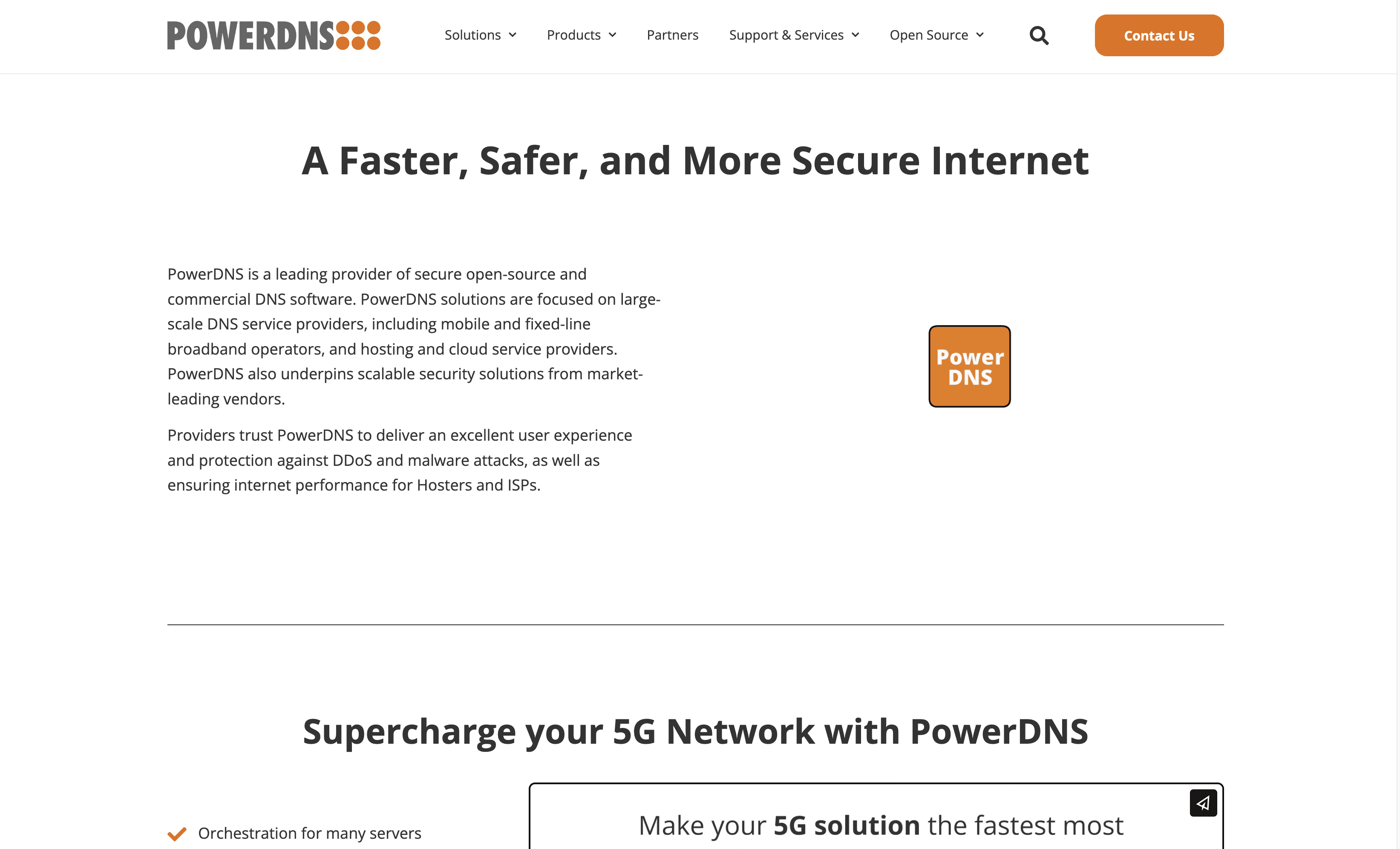
10 Alternatives to PowerDNS
1. Twingate
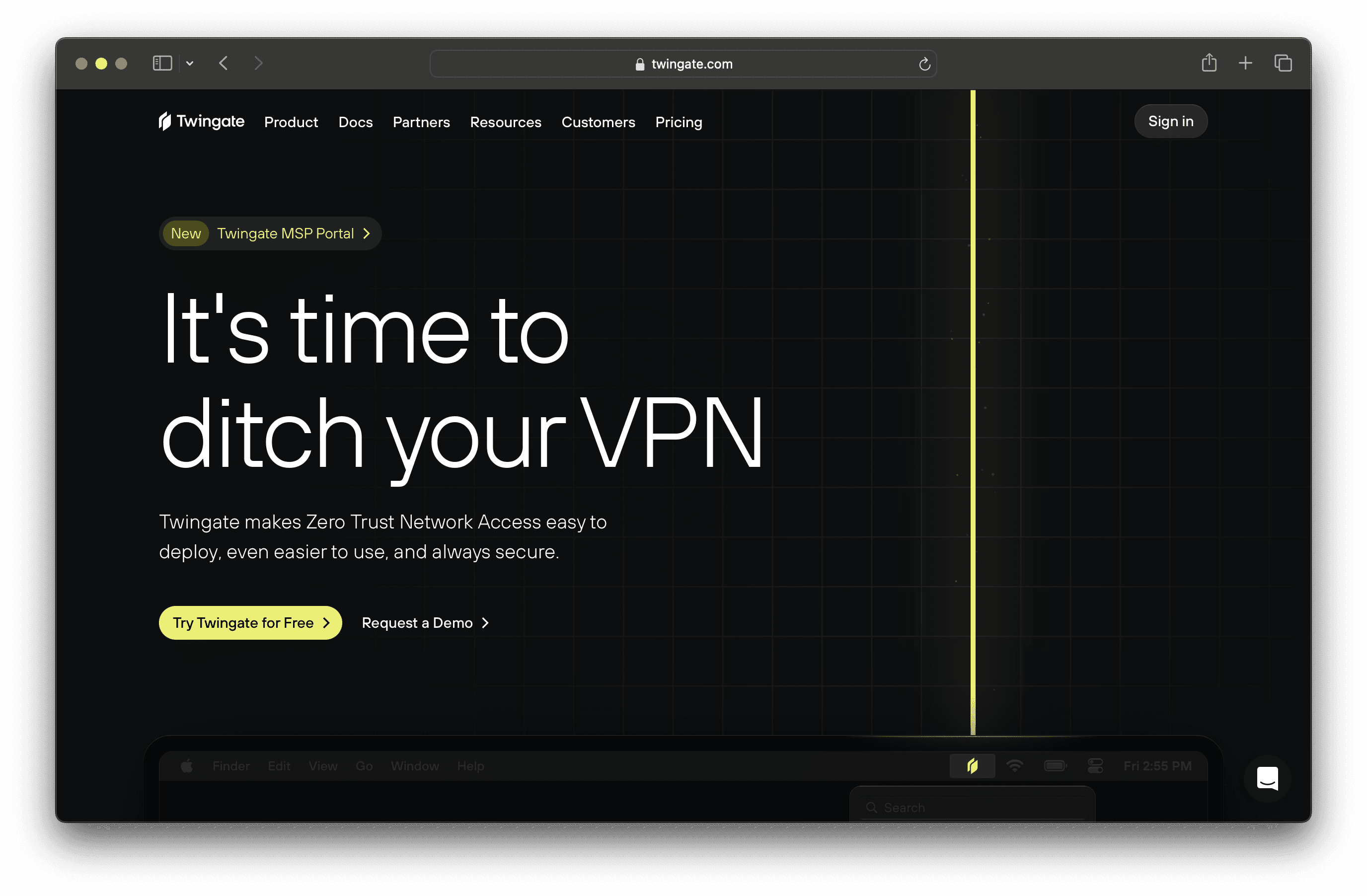
Twingate is a network security solution designed to replace traditional VPNs for remote access, offering a zero-trust security model and seamless deployment alongside existing infrastructure. With a focus on ease of use and scalability, Twingate aims to provide a secure and maintainable solution for businesses of all sizes.
Twingate Pricing
Starter: Free per user/month
Teams: $6 per user/month (monthly), $5 per user/month (yearly)
Business: $12 per user/month (monthly), $10 per user/month (yearly)
Enterprise: Custom pricing per user/month
Twingate Reviews
Twingate has an overall rating of 4.7 out of 5 stars based on 63 reviews. Users praise its ease of setup and high security. Check out more of our reviews here!
Pros and Cons of Twingate
Pros:
Seamless integration with existing infrastructure, making it easy to deploy without disrupting current systems.
Zero trust security model ensures that only authenticated users can access private resources, enhancing overall security.
High user satisfaction with ease of setup and use, reducing the learning curve for new users.
Cons:
Some users report performance issues, particularly with large-scale deployments, which can affect productivity.
Limited customization options may not meet the specific needs of all organizations, restricting flexibility.
Logging issues have been noted, making it difficult to track and audit user activity effectively.
2. Palo Alto Networks DNS Security
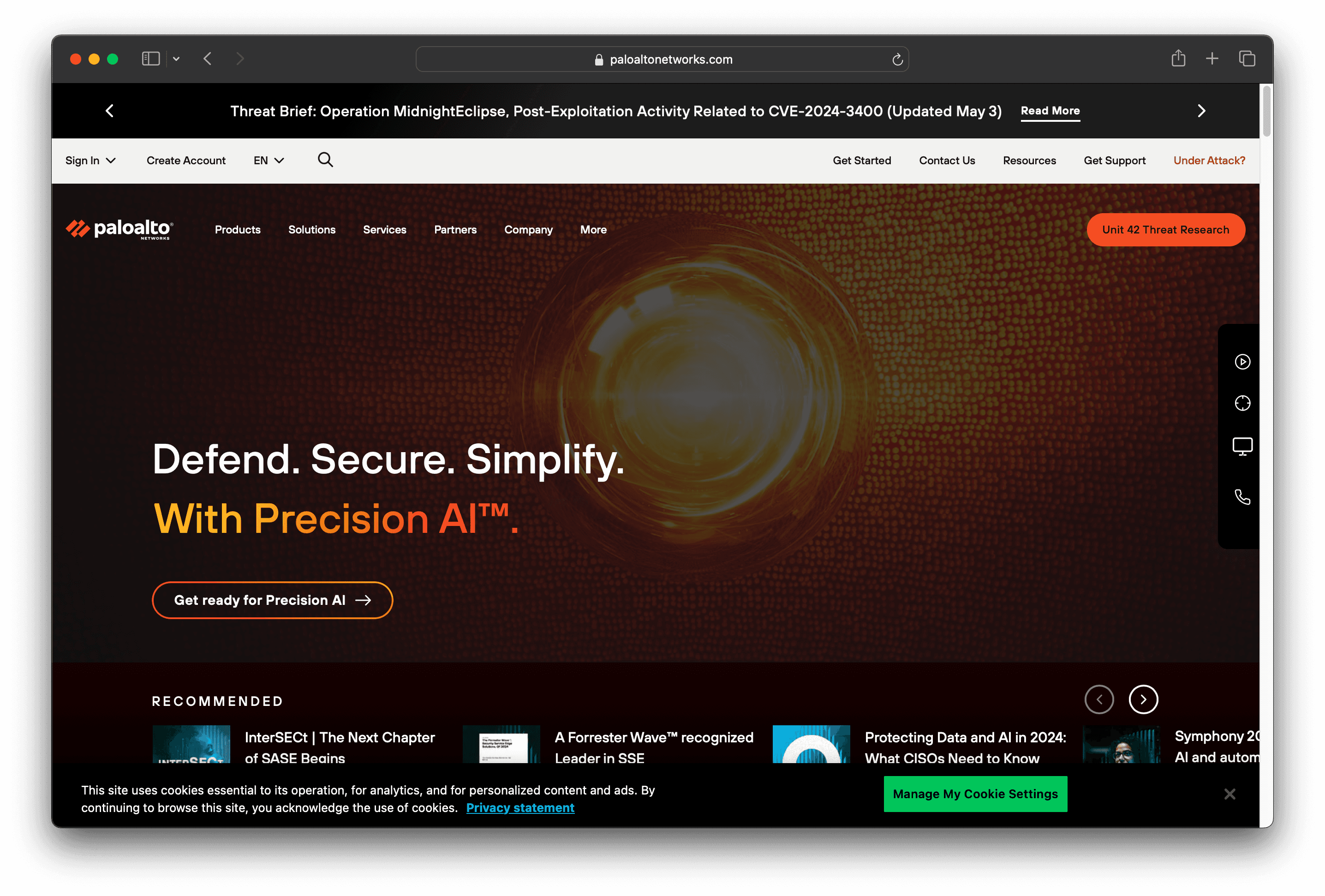
Palo Alto Networks DNS Security is designed to protect against DNS-based threats, offering real-time threat prevention and automated protection. It integrates seamlessly with existing infrastructure, ensuring robust security without compromising performance. This solution aims to enhance network security for businesses of all sizes, providing a reliable and scalable option.
Palo Alto Networks DNS Security Pricing
Palo Alto Networks DNS Security's pricing is not public. Contact their support for more info.
Palo Alto Networks DNS Security Reviews
Palo Alto Networks DNS Security has an overall rating of 4.4 out of 5 stars based on 15 reviews. Users praise its ease of configuration and comprehensive DNS traffic inspection. Check out more of our reviews here!
Pros and Cons ofPalo Alto Networks DNS Security
Pros:
Easy Configuration: Users find the setup and configuration of DNS security on Palo Alto firewalls straightforward and hassle-free.
Comprehensive DNS Traffic Inspection: The ability to fully inspect DNS traffic and generate detailed reports is highly appreciated.
Effective Threat Detection: Real-time threat detection using machine learning ensures robust protection against DNS-based attacks.
Cons:
Additional Licensing Costs: The high cost of the subscription for DNS security is a common concern among users.
Complex Configuration for Advanced Features: Some users find the configuration for complex countermeasures cumbersome and not always intuitive.
Customization Limitations: Limited customization options for advanced DNS security settings can be restrictive for some organizations.
3. Avast Secure Web Gateway
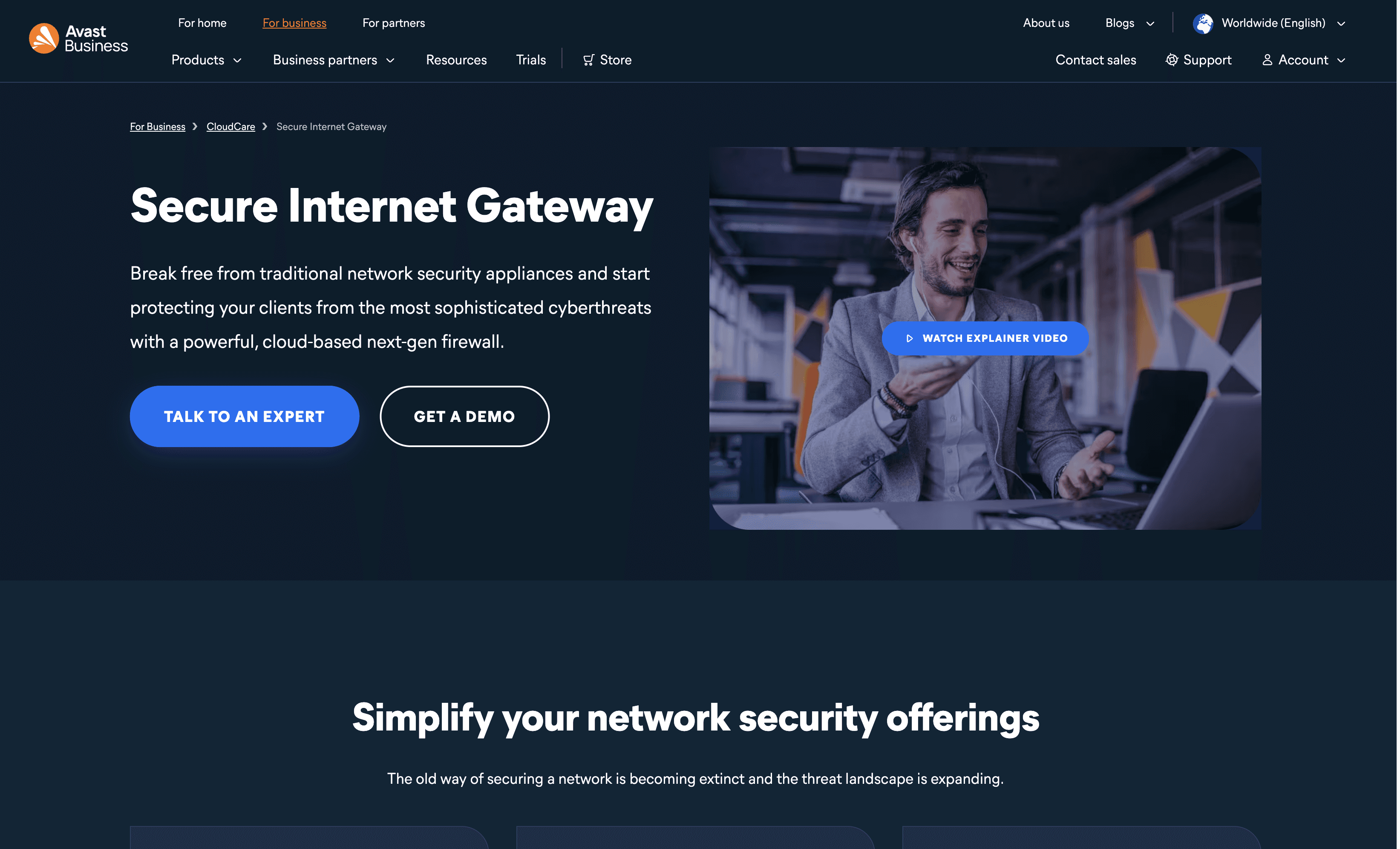
Avast Secure Web Gateway is a cloud-based security solution designed to protect against sophisticated cyber threats. It offers features like full SSL/TLS inspection, content filtering, and cloud sandboxing. With easy deployment and management through a cloud platform, it aims to provide robust security for businesses of all sizes.
Avast Secure Web Gateway Pricing
Avast Secure Web Gateway's pricing is not public. Contact their support for more info.
Avast Secure Web Gateway Reviews
Avast Secure Web Gateway has an overall rating of 5.0 out of 5 stars based on 2 reviews. Users praise its comprehensive protection and ease of use. Check out more of our reviews here!
Pros and Cons of Avast Secure Web Gateway
Pros:
Effective Threat Blocking: Blocks phishing and malware threats before they reach the network, ensuring robust protection.
Real-Time URL Scanning: Provides real-time scanning of URLs, adding an extra layer of security against web-based threats.
User-Friendly Interface: Intuitive and easy-to-use interface, making it accessible even for non-technical users.
Cons:
False Positives: Occasionally flags legitimate websites or content as malicious, causing inconvenience and potential workflow disruptions.
Performance Issues: The system can slow down significantly after blocking certain threats, affecting user experience.
Complexity for Small Businesses: Advanced features and settings might be overwhelming for smaller businesses without dedicated IT staff.
4. DNS Filter
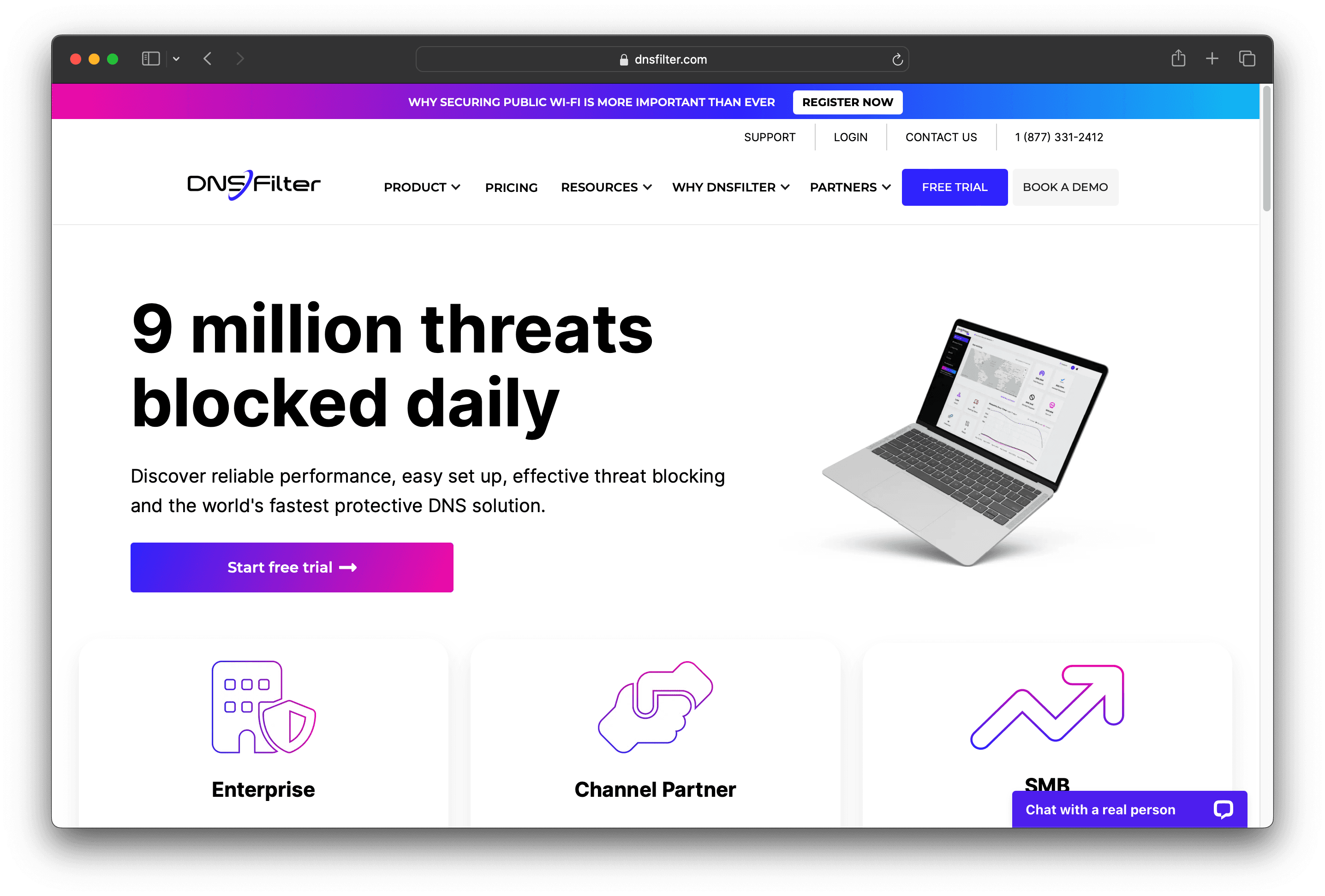
DNSFilter is a security solution that offers DNS filtering and website blocking to protect against threats like phishing and malware. It provides intuitive reporting, remote protection, and domain categorization, making it easy to manage and deploy. Suitable for various industries, DNSFilter ensures robust security with minimal administration.
DNS Filter Pricing
BASIC: $0.90 per user per month
PRO: $1.80 per user per month
ENTERPRISE: $2.70 per user per month
MSP: Starts at $150 per month
Public Wi-Fi: Starts at $0.25 per user per month or $1.25 per access point per month
Education: Starts at $4 per year for each student and staff member (125 user minimum)
DNS Filter Reviews
DNSFilter has an overall rating of 4.6 out of 5 stars based on 237 reviews. Users appreciate its ease of deployment and effective threat blocking. Check out more of our reviews here!
Pros and Cons of DNS Filter
Pros:
Effective Threat Blocking: Blocks 12 million threats daily, ensuring robust protection against phishing and malware.
Easy Setup: Quick and straightforward deployment, making it user-friendly for IT teams.
User-Friendly Interface: Intuitive and easy to manage, with features like universal access lists and query tools.
Cons:
Lack of DNS-over-HTTPS (DoH) Support: Does not support DNS-over-HTTPS, which is a significant drawback for some users.
Issues with VPN Compatibility: Some users report challenges with getting the software to work over VPNs.
Occasional Misclassification: Instances where sites are miscategorized, causing inconvenience.
5. Webroot
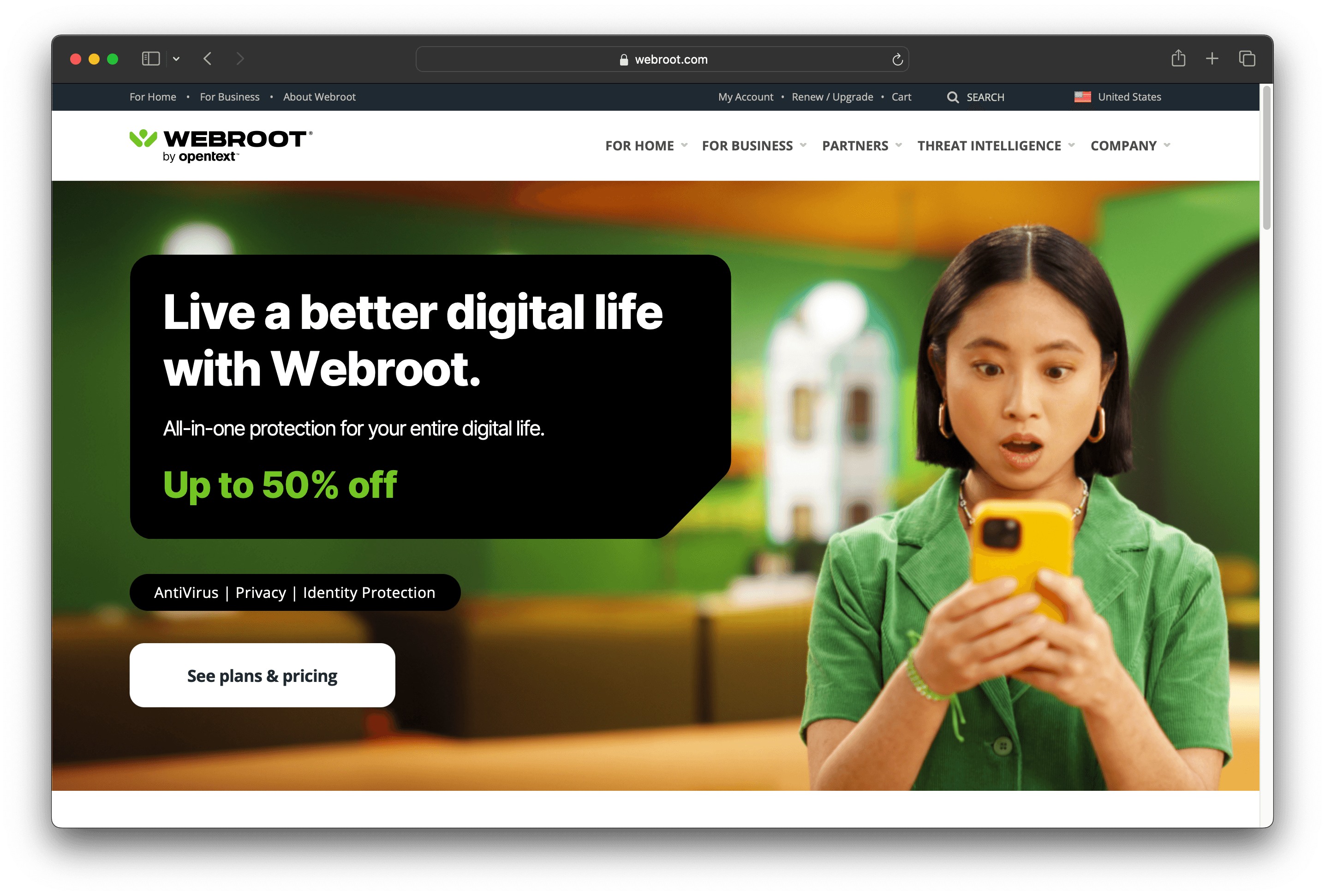
Webroot is a cloud-based DNS protection service designed to secure internet connections against cyberattacks. It offers features like detailed reporting, policy enforcement, and threat blocking. With an easy setup and management through the cloud, Webroot aims to provide robust security for businesses of all sizes.
Webroot Pricing
Business Endpoint Protection: $150.00 for 5 seats, $690.00 for 25 seats
DNS Protection: $150.00 for 5 seats, $690.00 for 25 seats
Security Awareness Training: $150.00 for 5 seats, $690.00 for 25 seats
Webroot Reviews
Webroot has an overall rating of 4.4 out of 5 stars based on 86 reviews. Users appreciate its ease of use and feature-rich console. Check out more of our reviews here!
Pros and Cons of Webroot
Pros:
Cloud-Based Service: No need for hardware or software installations, making it easy and quick to set up.
Detailed Reporting: Provides comprehensive reports on threats and web usage, enhancing visibility.
Policy Enforcement: Allows for granular control over internet usage by group, device, or IP.
Cons:
Higher Cost: More expensive compared to competitors like Cisco Umbrella, impacting budget-conscious businesses.
Configuration Complexity: Initial setup can be complicated, requiring technical expertise.
Occasional Instability: Instances of endpoints losing internet access, affecting productivity.
6. Azure DNS
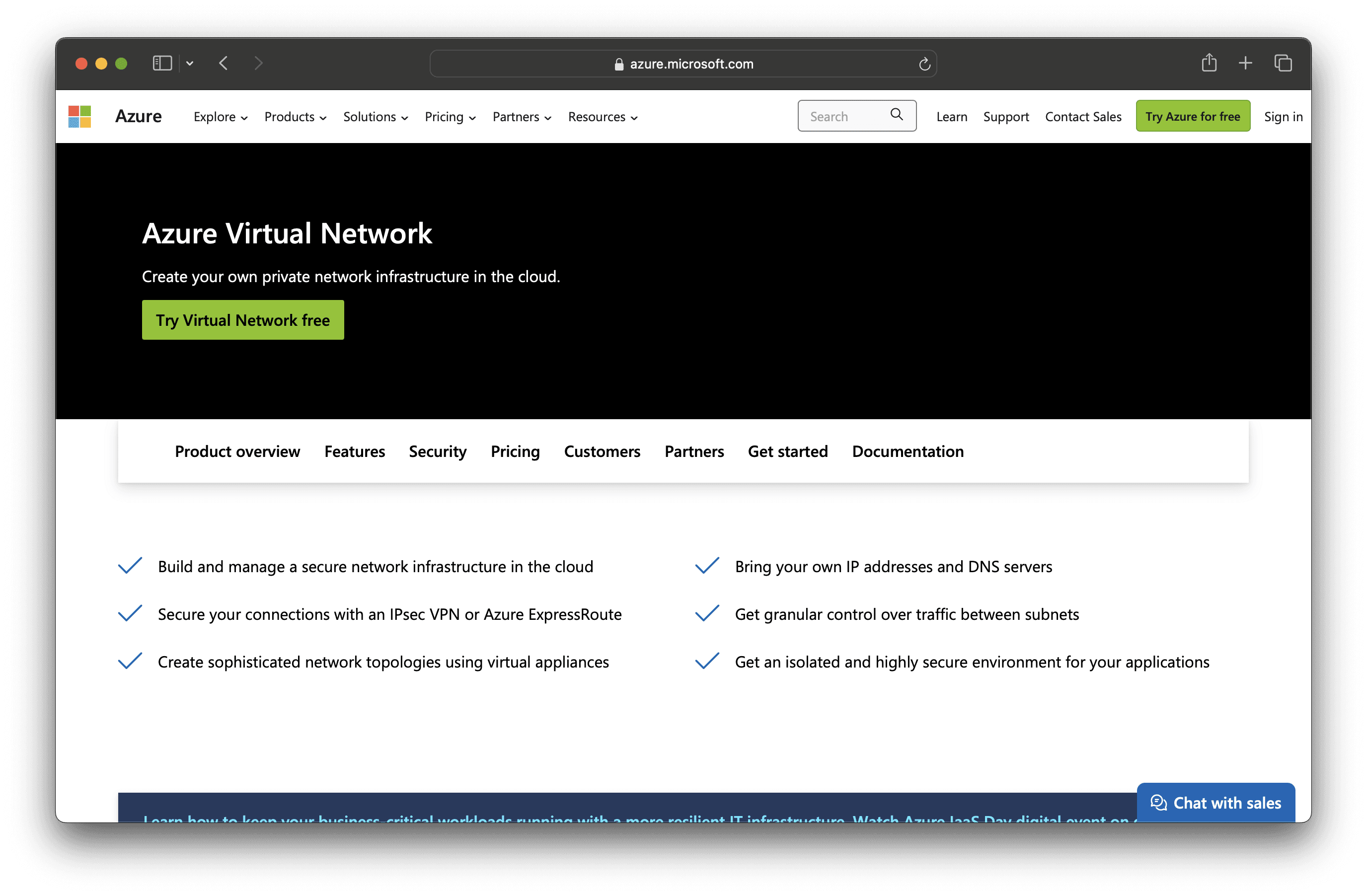
Azure DNS is a cloud-based service that allows you to host your DNS domains in Azure, managing DNS records with the same credentials and billing as other Azure services. It offers high availability, fast DNS queries, and seamless integration with existing infrastructure, making it a reliable choice for businesses of all sizes.
Azure DNS Pricing
Azure Free Account: $200 credit to use within 30 days.
Pay-as-you-go: Pay only for what you use beyond free monthly amounts.
Azure DNS Reviews
Azure DNS has an overall rating of 4.4 out of 5 stars based on 23 reviews. Users appreciate its reliability and seamless integration with other Azure services. Check out more of our reviews here!
Pros and Cons of Azure DNS
Pros:
High Availability: Azure DNS leverages Microsoft's global network, ensuring ultra-high availability and reliability for DNS queries.
Seamless Integration: Easily integrates with other Azure services, providing a unified management experience for DNS and cloud resources.
Fast DNS Queries: Utilizes Anycast networking to deliver rapid DNS query responses, enhancing overall performance.
Cons:
Complex Interface: Some users find the Azure DNS interface challenging to navigate, which can hinder efficient management.
Costly for Small Businesses: The pay-as-you-go pricing model can become expensive, particularly for smaller organizations with limited budgets.
Limited Features: Compared to other DNS services, Azure DNS may lack certain advanced features, limiting its flexibility.
7. Sophos
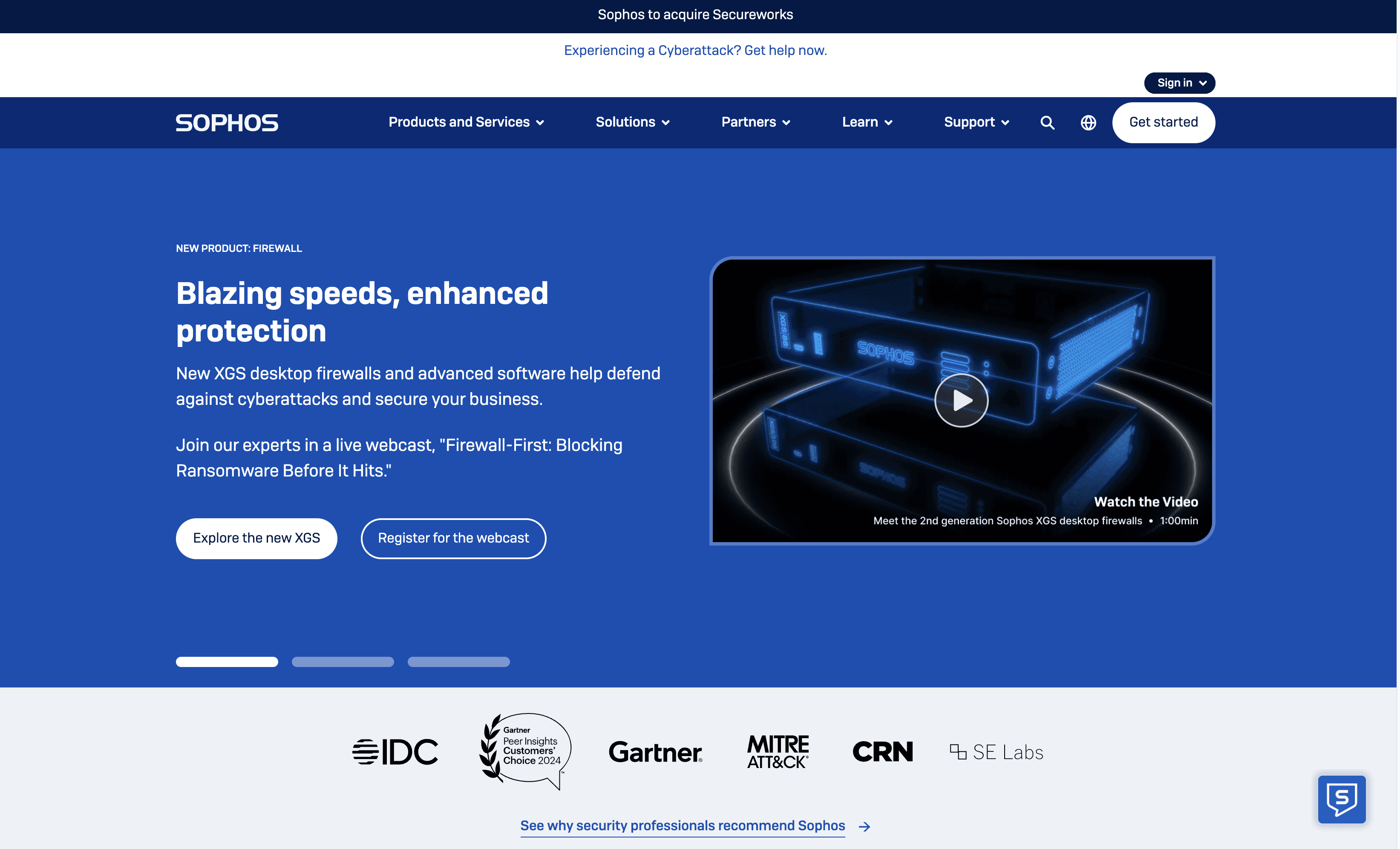
Sophos is a cybersecurity solution designed to protect against a wide range of cyber threats. It offers features like endpoint and network security, cloud protection, and managed services. With AI-powered intelligence and centralized management, Sophos aims to provide comprehensive and easy-to-use security for businesses of all sizes.
Sophos Pricing
Endpoint Protection: Contact support for pricing.
Network Security: Contact support for pricing.
Cloud Security: Contact support for pricing.
Managed Security Services: Contact support for pricing.
Sophos's pricing is not public. Contact their support for more info.
Sophos Reviews
Sophos has an overall rating of 4.6 out of 5 stars based on 334 reviews. Users appreciate its robust security features and ease of use. Check out more of our reviews here!
Pros and Cons of Sophos
Pros:
Comprehensive Security Solutions: Sophos offers a wide range of products, including endpoint, network, email, and cloud security.
Recognition and Awards: Consistently recognized as a leader in the Gartner Magic Quadrant for Endpoint Protection Platforms.
Advanced Threat Detection: Utilizes AI-powered cyber intelligence and human expertise for effective threat detection and response.
Cons:
Complexity for Small Businesses: The extensive product range can be overwhelming for small businesses without dedicated IT staff.
Cost: Advanced security solutions and managed services can be expensive, limiting accessibility for smaller organizations.
Integration Challenges: Integrating Sophos with existing systems might require significant effort and expertise.
8. NordLayer DNS Filtering
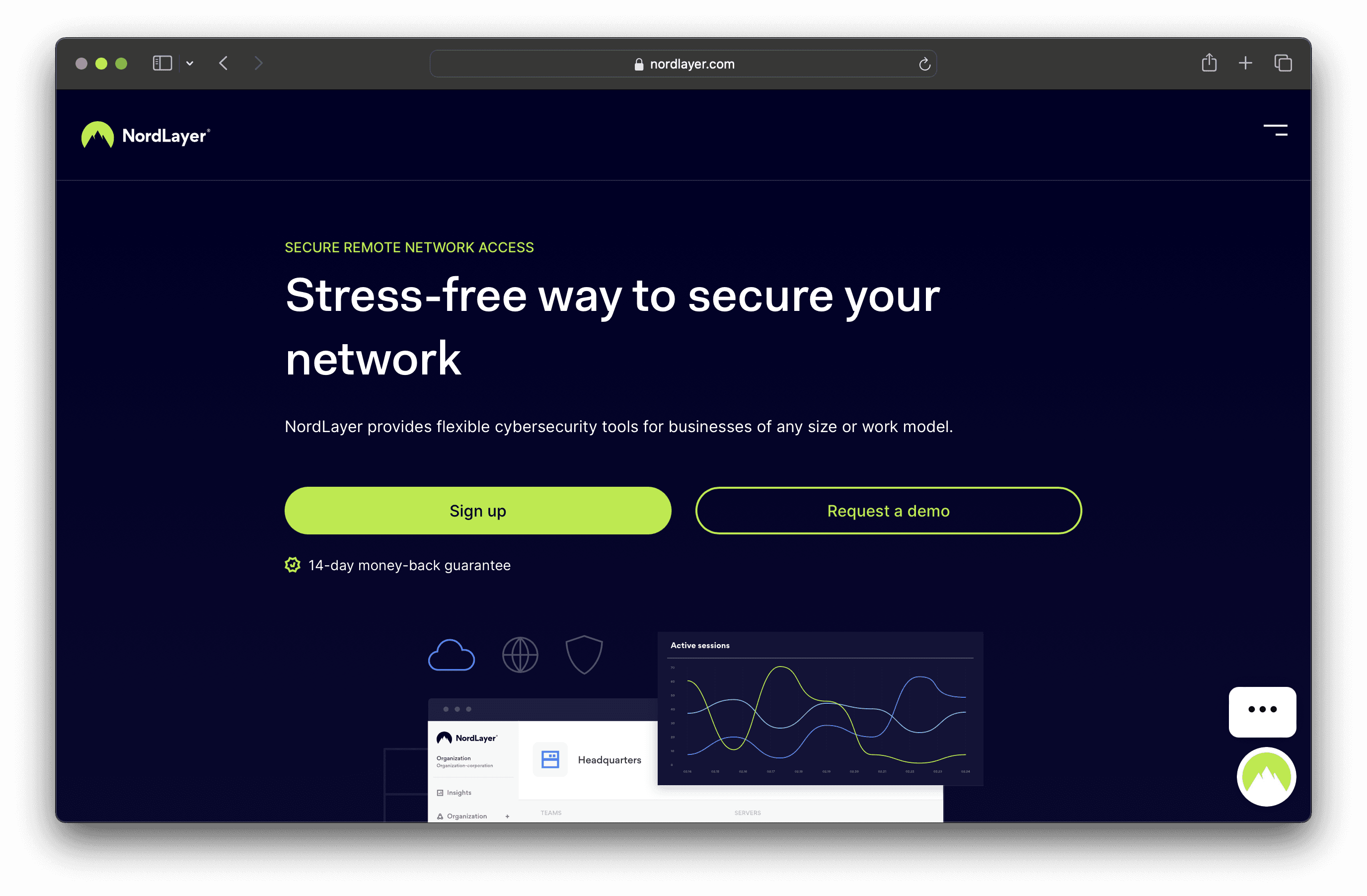
NordLayer DNS Filtering is a cybersecurity solution designed to protect against online threats by filtering malicious websites and blocking harmful content. It offers easy deployment, scalability, and seamless integration with existing infrastructure, making it a reliable choice for businesses of all sizes.
NordLayer DNS Filtering Pricing
Lite: $8 per user/month
Core: $11 per user/month
Premium: $14 per user/month
Enterprise: Custom pricing starting from $7 per user/month for teams over 50 seats
NordLayer DNS Filtering Reviews
NordLayer DNS Filtering has an overall rating of 4.3 out of 5 stars based on 117 reviews. Users praise its simplicity and security. Check out more of our reviews here!
Pros and Cons of NordLayer DNS Filtering
Pros:
Ease of Use: Intuitive interface simplifies navigation, making it accessible even for non-technical users.
Security: Robust threat prevention ensures safe browsing and data protection.
Performance Efficiency: High-speed servers maintain optimal performance without compromising security.
Cons:
Performance Issues: Users report occasional slowdowns, affecting overall efficiency.
Connection Issues: Some experience intermittent connectivity problems, disrupting workflow.
Access Issues: Difficulty accessing certain geo-specific content can be a limitation.
9. NextDNS
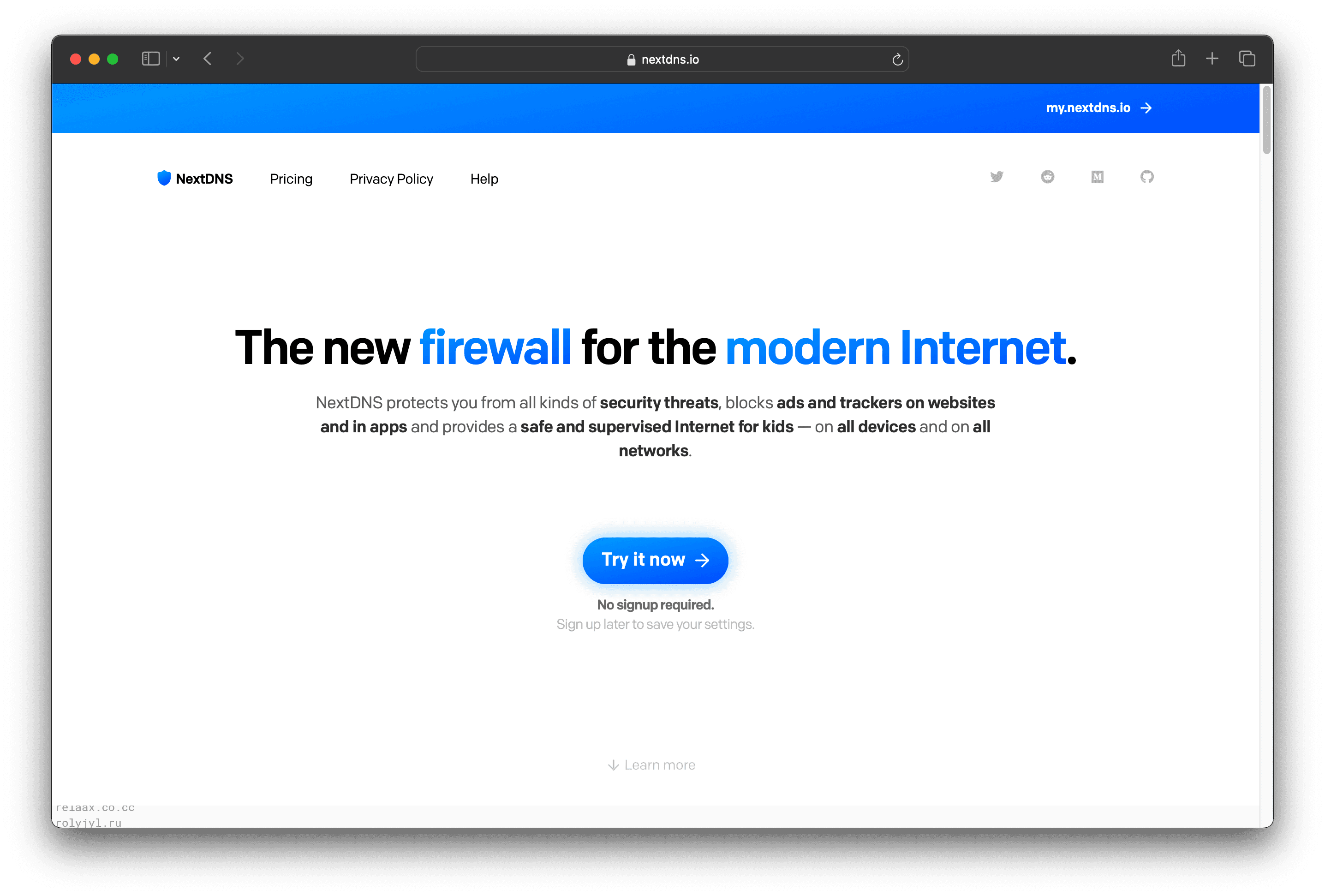
NextDNS is a modern firewall service designed to protect users from online threats, block ads and trackers, and provide parental controls. It offers easy setup, compatibility with all devices, and comprehensive security features, making it a reliable choice for businesses and individuals alike.
NextDNS Pricing
Free: $0/month
Pro: $1.99/month or $19.90/year
Business: $19.90/month or $199/year for every 50 employees
Education: $19.90/month or $199/year for every 250 students
NextDNS Reviews
NextDNS has an overall rating of 4.7 out of 5 stars based on 3 reviews. Users praise its ad blocking and privacy features. Check out more of our reviews here!
Pros and Cons of NextDNS
Pros:
Effective Ad Blocking: Blocks ads in Apple News and other desktop apps, enhancing user experience.
Privacy: Keeps DNS queries private, ensuring user data remains secure and confidential.
Easy Setup: Provides straightforward instructions for setting up DNS on multiple platforms, simplifying the process.
Cons:
Initial Setup Complexity: Can be confusing to set up the first time, requiring some technical knowledge.
Compatibility Issues: Some websites or services may not work correctly, necessitating occasional disabling of NextDNS.
Incomplete Ad Blocking: Some ads and tracking are not filtered or blocked, reducing overall effectiveness.
10. ESET Parental Control
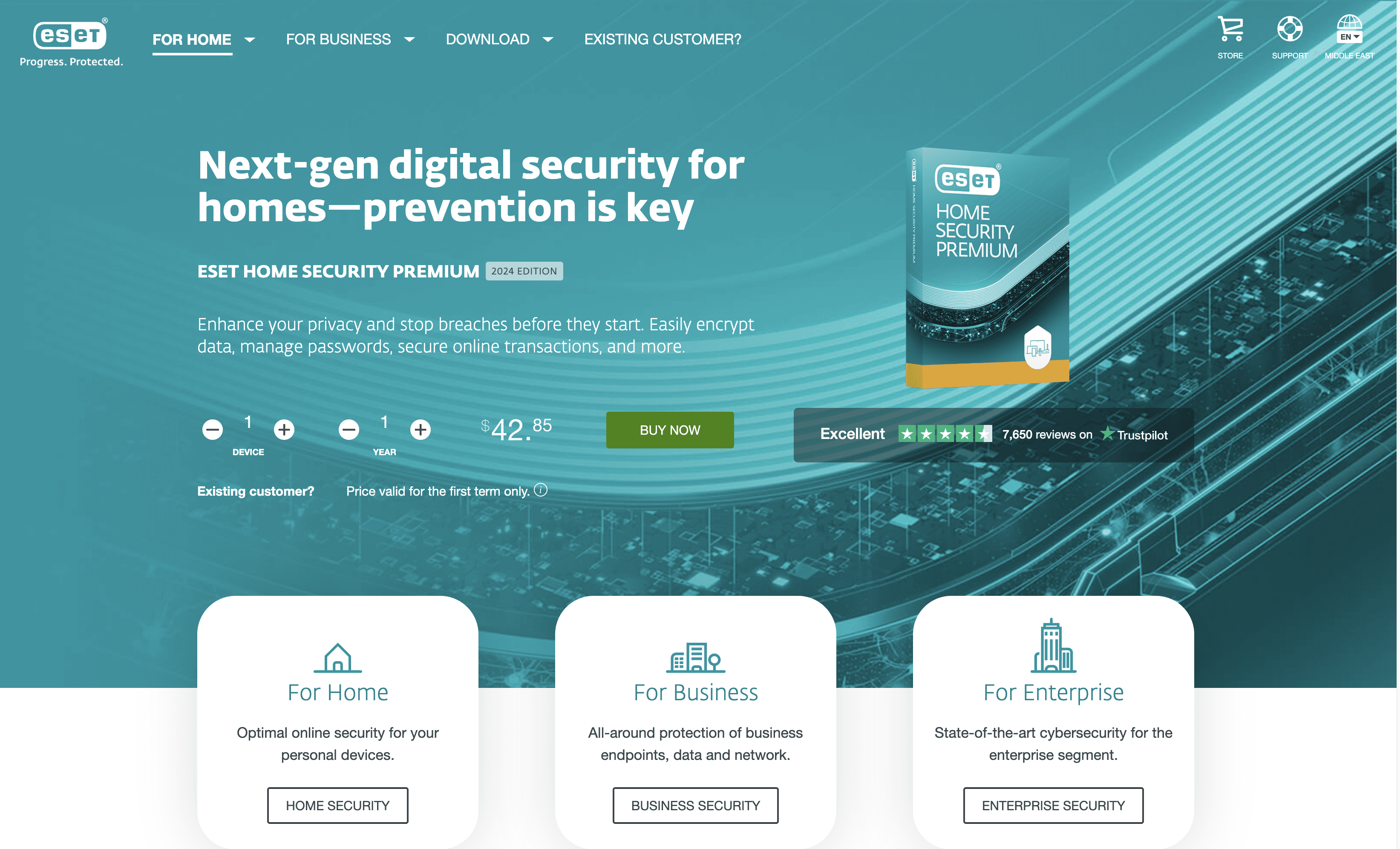
ESET Parental Control is a cybersecurity solution designed to help parents manage and monitor their children's online activities. It offers features like app blocking, web filtering, and location tracking. With an easy-to-use interface and robust security measures, ESET aims to provide a safe online environment for kids.
ESET Parental Control Pricing
Essential Plan: $29.95 per year for one device
Premium Plan: $44.95 per year for three devices
Ultimate Plan: $89.95 per year for five devices
ESET Parental Control Reviews
ESET Parental Control has an overall rating of 4.3 out of 5 stars based on 10 reviews. Users appreciate its ease of use and effective malware protection. Check out more of our reviews here!
Pros and Cons of ESET Parental Control
Pros:
Device Management: Allows for easy management of devices, including Anti-Theft and Parental Control setup.
Reliable Protection: Proven long-term results in providing reliable protection.
Minimal Impact: Efficient performance with minimal impact on device functionality.
Cons:
Complex Setup: Some users might find the initial setup and configuration of parental controls to be complex.
Subscription Costs: Ongoing subscription costs might be a concern for some users.
Feature Limitations: There might be limitations in the features available in lower-tier plans compared to the premium or ultimate plans.
Looking to secure your technical infrastructure?
Twingate offers granular access controls and deployment automations to protect your VPC environment. By leveraging Zero Trust security tools, Twingate ensures that private resources and internet traffic remain secure, making it an ideal solution for modern workforces. Try Twingate for Free today!
Rapidly implement a modern Zero Trust network that is more secure and maintainable than VPNs.
The Best 10 Alternatives to PowerDNS (+ Pricing & Reviews)
Twingate Team
•
Jul 27, 2024

PowerDNS provides secure open-source and commercial DNS software for large-scale DNS service providers, including mobile operators, broadband operators, and hosting providers. While PowerDNS offers robust solutions, it may not be suitable for everyone. This article explores how Twingate complements such DNS solutions for distributed workforces.

10 Alternatives to PowerDNS
1. Twingate

Twingate is a network security solution designed to replace traditional VPNs for remote access, offering a zero-trust security model and seamless deployment alongside existing infrastructure. With a focus on ease of use and scalability, Twingate aims to provide a secure and maintainable solution for businesses of all sizes.
Twingate Pricing
Starter: Free per user/month
Teams: $6 per user/month (monthly), $5 per user/month (yearly)
Business: $12 per user/month (monthly), $10 per user/month (yearly)
Enterprise: Custom pricing per user/month
Twingate Reviews
Twingate has an overall rating of 4.7 out of 5 stars based on 63 reviews. Users praise its ease of setup and high security. Check out more of our reviews here!
Pros and Cons of Twingate
Pros:
Seamless integration with existing infrastructure, making it easy to deploy without disrupting current systems.
Zero trust security model ensures that only authenticated users can access private resources, enhancing overall security.
High user satisfaction with ease of setup and use, reducing the learning curve for new users.
Cons:
Some users report performance issues, particularly with large-scale deployments, which can affect productivity.
Limited customization options may not meet the specific needs of all organizations, restricting flexibility.
Logging issues have been noted, making it difficult to track and audit user activity effectively.
2. Palo Alto Networks DNS Security

Palo Alto Networks DNS Security is designed to protect against DNS-based threats, offering real-time threat prevention and automated protection. It integrates seamlessly with existing infrastructure, ensuring robust security without compromising performance. This solution aims to enhance network security for businesses of all sizes, providing a reliable and scalable option.
Palo Alto Networks DNS Security Pricing
Palo Alto Networks DNS Security's pricing is not public. Contact their support for more info.
Palo Alto Networks DNS Security Reviews
Palo Alto Networks DNS Security has an overall rating of 4.4 out of 5 stars based on 15 reviews. Users praise its ease of configuration and comprehensive DNS traffic inspection. Check out more of our reviews here!
Pros and Cons ofPalo Alto Networks DNS Security
Pros:
Easy Configuration: Users find the setup and configuration of DNS security on Palo Alto firewalls straightforward and hassle-free.
Comprehensive DNS Traffic Inspection: The ability to fully inspect DNS traffic and generate detailed reports is highly appreciated.
Effective Threat Detection: Real-time threat detection using machine learning ensures robust protection against DNS-based attacks.
Cons:
Additional Licensing Costs: The high cost of the subscription for DNS security is a common concern among users.
Complex Configuration for Advanced Features: Some users find the configuration for complex countermeasures cumbersome and not always intuitive.
Customization Limitations: Limited customization options for advanced DNS security settings can be restrictive for some organizations.
3. Avast Secure Web Gateway

Avast Secure Web Gateway is a cloud-based security solution designed to protect against sophisticated cyber threats. It offers features like full SSL/TLS inspection, content filtering, and cloud sandboxing. With easy deployment and management through a cloud platform, it aims to provide robust security for businesses of all sizes.
Avast Secure Web Gateway Pricing
Avast Secure Web Gateway's pricing is not public. Contact their support for more info.
Avast Secure Web Gateway Reviews
Avast Secure Web Gateway has an overall rating of 5.0 out of 5 stars based on 2 reviews. Users praise its comprehensive protection and ease of use. Check out more of our reviews here!
Pros and Cons of Avast Secure Web Gateway
Pros:
Effective Threat Blocking: Blocks phishing and malware threats before they reach the network, ensuring robust protection.
Real-Time URL Scanning: Provides real-time scanning of URLs, adding an extra layer of security against web-based threats.
User-Friendly Interface: Intuitive and easy-to-use interface, making it accessible even for non-technical users.
Cons:
False Positives: Occasionally flags legitimate websites or content as malicious, causing inconvenience and potential workflow disruptions.
Performance Issues: The system can slow down significantly after blocking certain threats, affecting user experience.
Complexity for Small Businesses: Advanced features and settings might be overwhelming for smaller businesses without dedicated IT staff.
4. DNS Filter

DNSFilter is a security solution that offers DNS filtering and website blocking to protect against threats like phishing and malware. It provides intuitive reporting, remote protection, and domain categorization, making it easy to manage and deploy. Suitable for various industries, DNSFilter ensures robust security with minimal administration.
DNS Filter Pricing
BASIC: $0.90 per user per month
PRO: $1.80 per user per month
ENTERPRISE: $2.70 per user per month
MSP: Starts at $150 per month
Public Wi-Fi: Starts at $0.25 per user per month or $1.25 per access point per month
Education: Starts at $4 per year for each student and staff member (125 user minimum)
DNS Filter Reviews
DNSFilter has an overall rating of 4.6 out of 5 stars based on 237 reviews. Users appreciate its ease of deployment and effective threat blocking. Check out more of our reviews here!
Pros and Cons of DNS Filter
Pros:
Effective Threat Blocking: Blocks 12 million threats daily, ensuring robust protection against phishing and malware.
Easy Setup: Quick and straightforward deployment, making it user-friendly for IT teams.
User-Friendly Interface: Intuitive and easy to manage, with features like universal access lists and query tools.
Cons:
Lack of DNS-over-HTTPS (DoH) Support: Does not support DNS-over-HTTPS, which is a significant drawback for some users.
Issues with VPN Compatibility: Some users report challenges with getting the software to work over VPNs.
Occasional Misclassification: Instances where sites are miscategorized, causing inconvenience.
5. Webroot

Webroot is a cloud-based DNS protection service designed to secure internet connections against cyberattacks. It offers features like detailed reporting, policy enforcement, and threat blocking. With an easy setup and management through the cloud, Webroot aims to provide robust security for businesses of all sizes.
Webroot Pricing
Business Endpoint Protection: $150.00 for 5 seats, $690.00 for 25 seats
DNS Protection: $150.00 for 5 seats, $690.00 for 25 seats
Security Awareness Training: $150.00 for 5 seats, $690.00 for 25 seats
Webroot Reviews
Webroot has an overall rating of 4.4 out of 5 stars based on 86 reviews. Users appreciate its ease of use and feature-rich console. Check out more of our reviews here!
Pros and Cons of Webroot
Pros:
Cloud-Based Service: No need for hardware or software installations, making it easy and quick to set up.
Detailed Reporting: Provides comprehensive reports on threats and web usage, enhancing visibility.
Policy Enforcement: Allows for granular control over internet usage by group, device, or IP.
Cons:
Higher Cost: More expensive compared to competitors like Cisco Umbrella, impacting budget-conscious businesses.
Configuration Complexity: Initial setup can be complicated, requiring technical expertise.
Occasional Instability: Instances of endpoints losing internet access, affecting productivity.
6. Azure DNS

Azure DNS is a cloud-based service that allows you to host your DNS domains in Azure, managing DNS records with the same credentials and billing as other Azure services. It offers high availability, fast DNS queries, and seamless integration with existing infrastructure, making it a reliable choice for businesses of all sizes.
Azure DNS Pricing
Azure Free Account: $200 credit to use within 30 days.
Pay-as-you-go: Pay only for what you use beyond free monthly amounts.
Azure DNS Reviews
Azure DNS has an overall rating of 4.4 out of 5 stars based on 23 reviews. Users appreciate its reliability and seamless integration with other Azure services. Check out more of our reviews here!
Pros and Cons of Azure DNS
Pros:
High Availability: Azure DNS leverages Microsoft's global network, ensuring ultra-high availability and reliability for DNS queries.
Seamless Integration: Easily integrates with other Azure services, providing a unified management experience for DNS and cloud resources.
Fast DNS Queries: Utilizes Anycast networking to deliver rapid DNS query responses, enhancing overall performance.
Cons:
Complex Interface: Some users find the Azure DNS interface challenging to navigate, which can hinder efficient management.
Costly for Small Businesses: The pay-as-you-go pricing model can become expensive, particularly for smaller organizations with limited budgets.
Limited Features: Compared to other DNS services, Azure DNS may lack certain advanced features, limiting its flexibility.
7. Sophos

Sophos is a cybersecurity solution designed to protect against a wide range of cyber threats. It offers features like endpoint and network security, cloud protection, and managed services. With AI-powered intelligence and centralized management, Sophos aims to provide comprehensive and easy-to-use security for businesses of all sizes.
Sophos Pricing
Endpoint Protection: Contact support for pricing.
Network Security: Contact support for pricing.
Cloud Security: Contact support for pricing.
Managed Security Services: Contact support for pricing.
Sophos's pricing is not public. Contact their support for more info.
Sophos Reviews
Sophos has an overall rating of 4.6 out of 5 stars based on 334 reviews. Users appreciate its robust security features and ease of use. Check out more of our reviews here!
Pros and Cons of Sophos
Pros:
Comprehensive Security Solutions: Sophos offers a wide range of products, including endpoint, network, email, and cloud security.
Recognition and Awards: Consistently recognized as a leader in the Gartner Magic Quadrant for Endpoint Protection Platforms.
Advanced Threat Detection: Utilizes AI-powered cyber intelligence and human expertise for effective threat detection and response.
Cons:
Complexity for Small Businesses: The extensive product range can be overwhelming for small businesses without dedicated IT staff.
Cost: Advanced security solutions and managed services can be expensive, limiting accessibility for smaller organizations.
Integration Challenges: Integrating Sophos with existing systems might require significant effort and expertise.
8. NordLayer DNS Filtering

NordLayer DNS Filtering is a cybersecurity solution designed to protect against online threats by filtering malicious websites and blocking harmful content. It offers easy deployment, scalability, and seamless integration with existing infrastructure, making it a reliable choice for businesses of all sizes.
NordLayer DNS Filtering Pricing
Lite: $8 per user/month
Core: $11 per user/month
Premium: $14 per user/month
Enterprise: Custom pricing starting from $7 per user/month for teams over 50 seats
NordLayer DNS Filtering Reviews
NordLayer DNS Filtering has an overall rating of 4.3 out of 5 stars based on 117 reviews. Users praise its simplicity and security. Check out more of our reviews here!
Pros and Cons of NordLayer DNS Filtering
Pros:
Ease of Use: Intuitive interface simplifies navigation, making it accessible even for non-technical users.
Security: Robust threat prevention ensures safe browsing and data protection.
Performance Efficiency: High-speed servers maintain optimal performance without compromising security.
Cons:
Performance Issues: Users report occasional slowdowns, affecting overall efficiency.
Connection Issues: Some experience intermittent connectivity problems, disrupting workflow.
Access Issues: Difficulty accessing certain geo-specific content can be a limitation.
9. NextDNS

NextDNS is a modern firewall service designed to protect users from online threats, block ads and trackers, and provide parental controls. It offers easy setup, compatibility with all devices, and comprehensive security features, making it a reliable choice for businesses and individuals alike.
NextDNS Pricing
Free: $0/month
Pro: $1.99/month or $19.90/year
Business: $19.90/month or $199/year for every 50 employees
Education: $19.90/month or $199/year for every 250 students
NextDNS Reviews
NextDNS has an overall rating of 4.7 out of 5 stars based on 3 reviews. Users praise its ad blocking and privacy features. Check out more of our reviews here!
Pros and Cons of NextDNS
Pros:
Effective Ad Blocking: Blocks ads in Apple News and other desktop apps, enhancing user experience.
Privacy: Keeps DNS queries private, ensuring user data remains secure and confidential.
Easy Setup: Provides straightforward instructions for setting up DNS on multiple platforms, simplifying the process.
Cons:
Initial Setup Complexity: Can be confusing to set up the first time, requiring some technical knowledge.
Compatibility Issues: Some websites or services may not work correctly, necessitating occasional disabling of NextDNS.
Incomplete Ad Blocking: Some ads and tracking are not filtered or blocked, reducing overall effectiveness.
10. ESET Parental Control

ESET Parental Control is a cybersecurity solution designed to help parents manage and monitor their children's online activities. It offers features like app blocking, web filtering, and location tracking. With an easy-to-use interface and robust security measures, ESET aims to provide a safe online environment for kids.
ESET Parental Control Pricing
Essential Plan: $29.95 per year for one device
Premium Plan: $44.95 per year for three devices
Ultimate Plan: $89.95 per year for five devices
ESET Parental Control Reviews
ESET Parental Control has an overall rating of 4.3 out of 5 stars based on 10 reviews. Users appreciate its ease of use and effective malware protection. Check out more of our reviews here!
Pros and Cons of ESET Parental Control
Pros:
Device Management: Allows for easy management of devices, including Anti-Theft and Parental Control setup.
Reliable Protection: Proven long-term results in providing reliable protection.
Minimal Impact: Efficient performance with minimal impact on device functionality.
Cons:
Complex Setup: Some users might find the initial setup and configuration of parental controls to be complex.
Subscription Costs: Ongoing subscription costs might be a concern for some users.
Feature Limitations: There might be limitations in the features available in lower-tier plans compared to the premium or ultimate plans.
Looking to secure your technical infrastructure?
Twingate offers granular access controls and deployment automations to protect your VPC environment. By leveraging Zero Trust security tools, Twingate ensures that private resources and internet traffic remain secure, making it an ideal solution for modern workforces. Try Twingate for Free today!
Rapidly implement a modern Zero Trust network that is more secure and maintainable than VPNs.
The Best 10 Alternatives to PowerDNS (+ Pricing & Reviews)
Twingate Team
•
Jul 27, 2024

PowerDNS provides secure open-source and commercial DNS software for large-scale DNS service providers, including mobile operators, broadband operators, and hosting providers. While PowerDNS offers robust solutions, it may not be suitable for everyone. This article explores how Twingate complements such DNS solutions for distributed workforces.

10 Alternatives to PowerDNS
1. Twingate

Twingate is a network security solution designed to replace traditional VPNs for remote access, offering a zero-trust security model and seamless deployment alongside existing infrastructure. With a focus on ease of use and scalability, Twingate aims to provide a secure and maintainable solution for businesses of all sizes.
Twingate Pricing
Starter: Free per user/month
Teams: $6 per user/month (monthly), $5 per user/month (yearly)
Business: $12 per user/month (monthly), $10 per user/month (yearly)
Enterprise: Custom pricing per user/month
Twingate Reviews
Twingate has an overall rating of 4.7 out of 5 stars based on 63 reviews. Users praise its ease of setup and high security. Check out more of our reviews here!
Pros and Cons of Twingate
Pros:
Seamless integration with existing infrastructure, making it easy to deploy without disrupting current systems.
Zero trust security model ensures that only authenticated users can access private resources, enhancing overall security.
High user satisfaction with ease of setup and use, reducing the learning curve for new users.
Cons:
Some users report performance issues, particularly with large-scale deployments, which can affect productivity.
Limited customization options may not meet the specific needs of all organizations, restricting flexibility.
Logging issues have been noted, making it difficult to track and audit user activity effectively.
2. Palo Alto Networks DNS Security

Palo Alto Networks DNS Security is designed to protect against DNS-based threats, offering real-time threat prevention and automated protection. It integrates seamlessly with existing infrastructure, ensuring robust security without compromising performance. This solution aims to enhance network security for businesses of all sizes, providing a reliable and scalable option.
Palo Alto Networks DNS Security Pricing
Palo Alto Networks DNS Security's pricing is not public. Contact their support for more info.
Palo Alto Networks DNS Security Reviews
Palo Alto Networks DNS Security has an overall rating of 4.4 out of 5 stars based on 15 reviews. Users praise its ease of configuration and comprehensive DNS traffic inspection. Check out more of our reviews here!
Pros and Cons ofPalo Alto Networks DNS Security
Pros:
Easy Configuration: Users find the setup and configuration of DNS security on Palo Alto firewalls straightforward and hassle-free.
Comprehensive DNS Traffic Inspection: The ability to fully inspect DNS traffic and generate detailed reports is highly appreciated.
Effective Threat Detection: Real-time threat detection using machine learning ensures robust protection against DNS-based attacks.
Cons:
Additional Licensing Costs: The high cost of the subscription for DNS security is a common concern among users.
Complex Configuration for Advanced Features: Some users find the configuration for complex countermeasures cumbersome and not always intuitive.
Customization Limitations: Limited customization options for advanced DNS security settings can be restrictive for some organizations.
3. Avast Secure Web Gateway

Avast Secure Web Gateway is a cloud-based security solution designed to protect against sophisticated cyber threats. It offers features like full SSL/TLS inspection, content filtering, and cloud sandboxing. With easy deployment and management through a cloud platform, it aims to provide robust security for businesses of all sizes.
Avast Secure Web Gateway Pricing
Avast Secure Web Gateway's pricing is not public. Contact their support for more info.
Avast Secure Web Gateway Reviews
Avast Secure Web Gateway has an overall rating of 5.0 out of 5 stars based on 2 reviews. Users praise its comprehensive protection and ease of use. Check out more of our reviews here!
Pros and Cons of Avast Secure Web Gateway
Pros:
Effective Threat Blocking: Blocks phishing and malware threats before they reach the network, ensuring robust protection.
Real-Time URL Scanning: Provides real-time scanning of URLs, adding an extra layer of security against web-based threats.
User-Friendly Interface: Intuitive and easy-to-use interface, making it accessible even for non-technical users.
Cons:
False Positives: Occasionally flags legitimate websites or content as malicious, causing inconvenience and potential workflow disruptions.
Performance Issues: The system can slow down significantly after blocking certain threats, affecting user experience.
Complexity for Small Businesses: Advanced features and settings might be overwhelming for smaller businesses without dedicated IT staff.
4. DNS Filter

DNSFilter is a security solution that offers DNS filtering and website blocking to protect against threats like phishing and malware. It provides intuitive reporting, remote protection, and domain categorization, making it easy to manage and deploy. Suitable for various industries, DNSFilter ensures robust security with minimal administration.
DNS Filter Pricing
BASIC: $0.90 per user per month
PRO: $1.80 per user per month
ENTERPRISE: $2.70 per user per month
MSP: Starts at $150 per month
Public Wi-Fi: Starts at $0.25 per user per month or $1.25 per access point per month
Education: Starts at $4 per year for each student and staff member (125 user minimum)
DNS Filter Reviews
DNSFilter has an overall rating of 4.6 out of 5 stars based on 237 reviews. Users appreciate its ease of deployment and effective threat blocking. Check out more of our reviews here!
Pros and Cons of DNS Filter
Pros:
Effective Threat Blocking: Blocks 12 million threats daily, ensuring robust protection against phishing and malware.
Easy Setup: Quick and straightforward deployment, making it user-friendly for IT teams.
User-Friendly Interface: Intuitive and easy to manage, with features like universal access lists and query tools.
Cons:
Lack of DNS-over-HTTPS (DoH) Support: Does not support DNS-over-HTTPS, which is a significant drawback for some users.
Issues with VPN Compatibility: Some users report challenges with getting the software to work over VPNs.
Occasional Misclassification: Instances where sites are miscategorized, causing inconvenience.
5. Webroot

Webroot is a cloud-based DNS protection service designed to secure internet connections against cyberattacks. It offers features like detailed reporting, policy enforcement, and threat blocking. With an easy setup and management through the cloud, Webroot aims to provide robust security for businesses of all sizes.
Webroot Pricing
Business Endpoint Protection: $150.00 for 5 seats, $690.00 for 25 seats
DNS Protection: $150.00 for 5 seats, $690.00 for 25 seats
Security Awareness Training: $150.00 for 5 seats, $690.00 for 25 seats
Webroot Reviews
Webroot has an overall rating of 4.4 out of 5 stars based on 86 reviews. Users appreciate its ease of use and feature-rich console. Check out more of our reviews here!
Pros and Cons of Webroot
Pros:
Cloud-Based Service: No need for hardware or software installations, making it easy and quick to set up.
Detailed Reporting: Provides comprehensive reports on threats and web usage, enhancing visibility.
Policy Enforcement: Allows for granular control over internet usage by group, device, or IP.
Cons:
Higher Cost: More expensive compared to competitors like Cisco Umbrella, impacting budget-conscious businesses.
Configuration Complexity: Initial setup can be complicated, requiring technical expertise.
Occasional Instability: Instances of endpoints losing internet access, affecting productivity.
6. Azure DNS

Azure DNS is a cloud-based service that allows you to host your DNS domains in Azure, managing DNS records with the same credentials and billing as other Azure services. It offers high availability, fast DNS queries, and seamless integration with existing infrastructure, making it a reliable choice for businesses of all sizes.
Azure DNS Pricing
Azure Free Account: $200 credit to use within 30 days.
Pay-as-you-go: Pay only for what you use beyond free monthly amounts.
Azure DNS Reviews
Azure DNS has an overall rating of 4.4 out of 5 stars based on 23 reviews. Users appreciate its reliability and seamless integration with other Azure services. Check out more of our reviews here!
Pros and Cons of Azure DNS
Pros:
High Availability: Azure DNS leverages Microsoft's global network, ensuring ultra-high availability and reliability for DNS queries.
Seamless Integration: Easily integrates with other Azure services, providing a unified management experience for DNS and cloud resources.
Fast DNS Queries: Utilizes Anycast networking to deliver rapid DNS query responses, enhancing overall performance.
Cons:
Complex Interface: Some users find the Azure DNS interface challenging to navigate, which can hinder efficient management.
Costly for Small Businesses: The pay-as-you-go pricing model can become expensive, particularly for smaller organizations with limited budgets.
Limited Features: Compared to other DNS services, Azure DNS may lack certain advanced features, limiting its flexibility.
7. Sophos

Sophos is a cybersecurity solution designed to protect against a wide range of cyber threats. It offers features like endpoint and network security, cloud protection, and managed services. With AI-powered intelligence and centralized management, Sophos aims to provide comprehensive and easy-to-use security for businesses of all sizes.
Sophos Pricing
Endpoint Protection: Contact support for pricing.
Network Security: Contact support for pricing.
Cloud Security: Contact support for pricing.
Managed Security Services: Contact support for pricing.
Sophos's pricing is not public. Contact their support for more info.
Sophos Reviews
Sophos has an overall rating of 4.6 out of 5 stars based on 334 reviews. Users appreciate its robust security features and ease of use. Check out more of our reviews here!
Pros and Cons of Sophos
Pros:
Comprehensive Security Solutions: Sophos offers a wide range of products, including endpoint, network, email, and cloud security.
Recognition and Awards: Consistently recognized as a leader in the Gartner Magic Quadrant for Endpoint Protection Platforms.
Advanced Threat Detection: Utilizes AI-powered cyber intelligence and human expertise for effective threat detection and response.
Cons:
Complexity for Small Businesses: The extensive product range can be overwhelming for small businesses without dedicated IT staff.
Cost: Advanced security solutions and managed services can be expensive, limiting accessibility for smaller organizations.
Integration Challenges: Integrating Sophos with existing systems might require significant effort and expertise.
8. NordLayer DNS Filtering

NordLayer DNS Filtering is a cybersecurity solution designed to protect against online threats by filtering malicious websites and blocking harmful content. It offers easy deployment, scalability, and seamless integration with existing infrastructure, making it a reliable choice for businesses of all sizes.
NordLayer DNS Filtering Pricing
Lite: $8 per user/month
Core: $11 per user/month
Premium: $14 per user/month
Enterprise: Custom pricing starting from $7 per user/month for teams over 50 seats
NordLayer DNS Filtering Reviews
NordLayer DNS Filtering has an overall rating of 4.3 out of 5 stars based on 117 reviews. Users praise its simplicity and security. Check out more of our reviews here!
Pros and Cons of NordLayer DNS Filtering
Pros:
Ease of Use: Intuitive interface simplifies navigation, making it accessible even for non-technical users.
Security: Robust threat prevention ensures safe browsing and data protection.
Performance Efficiency: High-speed servers maintain optimal performance without compromising security.
Cons:
Performance Issues: Users report occasional slowdowns, affecting overall efficiency.
Connection Issues: Some experience intermittent connectivity problems, disrupting workflow.
Access Issues: Difficulty accessing certain geo-specific content can be a limitation.
9. NextDNS

NextDNS is a modern firewall service designed to protect users from online threats, block ads and trackers, and provide parental controls. It offers easy setup, compatibility with all devices, and comprehensive security features, making it a reliable choice for businesses and individuals alike.
NextDNS Pricing
Free: $0/month
Pro: $1.99/month or $19.90/year
Business: $19.90/month or $199/year for every 50 employees
Education: $19.90/month or $199/year for every 250 students
NextDNS Reviews
NextDNS has an overall rating of 4.7 out of 5 stars based on 3 reviews. Users praise its ad blocking and privacy features. Check out more of our reviews here!
Pros and Cons of NextDNS
Pros:
Effective Ad Blocking: Blocks ads in Apple News and other desktop apps, enhancing user experience.
Privacy: Keeps DNS queries private, ensuring user data remains secure and confidential.
Easy Setup: Provides straightforward instructions for setting up DNS on multiple platforms, simplifying the process.
Cons:
Initial Setup Complexity: Can be confusing to set up the first time, requiring some technical knowledge.
Compatibility Issues: Some websites or services may not work correctly, necessitating occasional disabling of NextDNS.
Incomplete Ad Blocking: Some ads and tracking are not filtered or blocked, reducing overall effectiveness.
10. ESET Parental Control

ESET Parental Control is a cybersecurity solution designed to help parents manage and monitor their children's online activities. It offers features like app blocking, web filtering, and location tracking. With an easy-to-use interface and robust security measures, ESET aims to provide a safe online environment for kids.
ESET Parental Control Pricing
Essential Plan: $29.95 per year for one device
Premium Plan: $44.95 per year for three devices
Ultimate Plan: $89.95 per year for five devices
ESET Parental Control Reviews
ESET Parental Control has an overall rating of 4.3 out of 5 stars based on 10 reviews. Users appreciate its ease of use and effective malware protection. Check out more of our reviews here!
Pros and Cons of ESET Parental Control
Pros:
Device Management: Allows for easy management of devices, including Anti-Theft and Parental Control setup.
Reliable Protection: Proven long-term results in providing reliable protection.
Minimal Impact: Efficient performance with minimal impact on device functionality.
Cons:
Complex Setup: Some users might find the initial setup and configuration of parental controls to be complex.
Subscription Costs: Ongoing subscription costs might be a concern for some users.
Feature Limitations: There might be limitations in the features available in lower-tier plans compared to the premium or ultimate plans.
Looking to secure your technical infrastructure?
Twingate offers granular access controls and deployment automations to protect your VPC environment. By leveraging Zero Trust security tools, Twingate ensures that private resources and internet traffic remain secure, making it an ideal solution for modern workforces. Try Twingate for Free today!
Solutions
Solutions
The VPN replacement your workforce will love.
Solutions